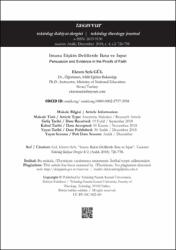| dc.contributor.author | Gül, Ekrem Sefa | |
| dc.date.accessioned | 2019-07-12T07:57:48Z | |
| dc.date.available | 2019-07-12T07:57:48Z | |
| dc.date.issued | 2018 | |
| dc.identifier.uri | https://hdl.handle.net/20.500.11776/3191 | |
| dc.description.abstract | İman, insanın dünyada ve ahirette mutluluğunu ve kurtuluşunu sağlayan en yüksek hakikattir. Bâtıl ise özü itibarı ile boş, geçersiz ve yanlıştır. Şu halde huzur ve kurtuluşun gerçekleşmesi ancak hak bir inanca sahip olmakla müm-kündür. İnancın hak olmasının bir diğer sonucu ise bu inancın hak olduğunu bilebilme imkânıdır. Hakka inanmak, hakkaniyeti temin eder ve bu hakikati ispat ve izhâr etmeyi mümkün kılar. Şüphelerle sarsılmaktan uzak, doğru ve kesin bir tasdik olarak imana sahip olmak; doğruluk ve kesinliğe dair belli birtakım kriterleri gerekli kılar. Bu durum imanı savunmayı ve başka insanla-ra ulaştırmayı da içerdiğinden bu hakikatlerin bilinmesi ve ispat edilmesiyle yakından ilgilidir. Ayrıca bilgi ve bilgisizlik kadar sanmak ve inanmak ara-sındaki ayrımı araştırmayı gerektirir. Buna ek olarak kesinlik, şüphe, delil, ikna ve ispat kavramlarını ve bunların iman açısından neye tekâbül ettiklerini incelemeyi de içine alır. İmana ilişkin delillerin ikna ve ispat bakımından ele alınması hak bir inancın kesinliğine dair kavrayışı da yükseltecektir. | en_US |
| dc.description.abstract | Faith is the highest truth that ensures the happiness and salvation of man in the world and in the Hereafter. But the essence of falsehood is null, is inva-lid and wrong. Thus, this happiness and salvation is only possible by having a true faith. Another consequence of the true faith is the ability to recognize that this belief is right. Believing in Truth (al-Haqq) ensures the rightness and ma-kes proving and disclousing this Truth possible. Having a true, accurate faith which is above suspicion, requires certain criteria for accuracy and precision. In addition, this situation involves advocating the faith and delivering it to other people. This is closely related to the recognition of these truths. It also makes it necessary to explore the distinction between presumption and belie-ving as well as knowledge and ignorance. Additionaly it requires examination of the concepts of certainty, doubt, evidence, persuasion and proof and what they correspond to in terms of faith. The examination of the proofs of faith in terms of persuasion and proof also increases the understanding of the certa-inty of belief. | en_US |
| dc.language.iso | tur | en_US |
| dc.publisher | Namık Kemal Üniversitesi | en_US |
| dc.rights | info:eu-repo/semantics/openAccess | en_US |
| dc.subject | İman | en_US |
| dc.subject | Delil | en_US |
| dc.subject | İspat | en_US |
| dc.subject | İkna | en_US |
| dc.subject | Şüphe | en_US |
| dc.subject | Kesinlik | en_US |
| dc.subject | Faith | en_US |
| dc.subject | Proof | en_US |
| dc.subject | Evidence | en_US |
| dc.subject | Persuasion | en_US |
| dc.subject | Doubt | en_US |
| dc.subject | Certainty | en_US |
| dc.title | İmana İlişkin Delillerde İkna ve İspat | en_US |
| dc.title.alternative | Persuasion and Evidence in the Proofs of Faith | en_US |
| dc.type | article | en_US |
| dc.relation.ispartof | Tasavvur / Tekirdağ İlahiyat Dergisi | en_US |
| dc.department | Tekirdağ Namık Kemal Üniversitesi Dergileri | en_US |
| dc.identifier.volume | 4 | en_US |
| dc.identifier.issue | 2 | en_US |
| dc.identifier.startpage | 726 | en_US |
| dc.identifier.endpage | 758 | en_US |
| dc.relation.publicationcategory | Makale - Ulusal Hakemli Dergi - Başka Kurum Yazarı | en_US |



















